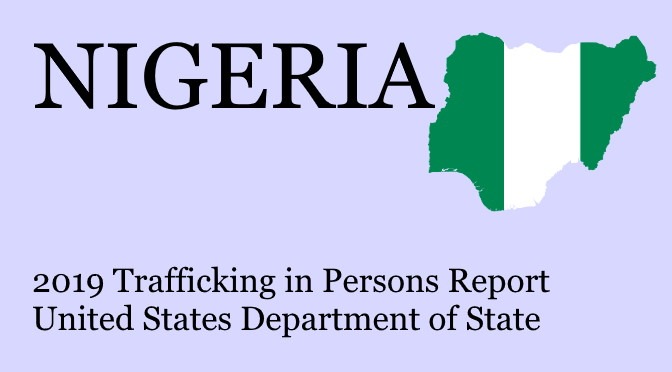
The government decreased efforts to identify and protect trafficking victims. NAPTIP identified 126 forced labor victims and 1,028 potential victims. This was a decrease compared to 188 forced labor victims and 1,121 potential trafficking victims identified in the previous reporting period. During the reporting period, the ESTF referred to care 1,030 returning migrants, some of whom were trafficking victims. The government had formal written procedures to guide law enforcement, immigration, and social services personnel in proactive identification of trafficking victims among highrisk populations, and NAPTIP trained police, immigration, and social services personnel to identify trafficking victims and direct them to NAPTIP. Additionally, the government’s national referral mechanism provided formal guidelines for law enforcement, immigration officials, and service providers to improve protection and assistance to trafficking victims, both within Nigeria and abroad. Although the law mandated NAPTIP to care solely for victims of crimes under the 2015 anti-trafficking law, the government often referred victims of other crimes to NAPTIP, which reduced its capacity to care for trafficking victims. NAPTIP’s 10 zonal commands, including the Abuja headquarters, each operated a victim shelter during the reporting period, for a total of 10 shelters for trafficking victims. These shelters were also available to Nigerian trafficking victims exploited abroad upon repatriation.
In response to a large number of Nigerian migrants stranded in Libya, including some trafficking victims, the government created an inter-ministerial committee to facilitate repatriation and resettlement in Nigeria for those migrants in the previous reporting period. The influx of migrants returned from Libya, some of whom were trafficking victims, overwhelmed the shelter and service system, including NAPTIP facilities. In May 2018, the governor of Edo State signed the Edo state anti-trafficking law, which codified the ESTF and provided a legal framework for state-level anti-trafficking efforts. Several Nigerian embassies, particularly within West Africa, provided funding or in-kind support to repatriate Nigerian trafficking victims exploited abroad. The anti-trafficking law prohibited the penalization of trafficking victims for unlawful acts committed as a result of being subjected to trafficking, including by armed groups. However, multiple credible international organizations reported the government continued to arrest and in some cases detain for prolonged periods, reportedly for screening and perceived intelligence value, women and children removed from or allegedly associated with Boko Haram and ISIS-WA, including women and girls who had been forcibly married to or sexually enslaved by the insurgents; authorities did not consistently screen for trafficking. While the standard procedures developed in partnership with an international organization improved identification of potential trafficking victims among those detained, some trafficking victims remained in detention and subject to criminal prosecution, contrary to Nigerian law, for unlawful acts traffickers compelled them to commit.
The victims’ trust fund, financed primarily through confiscated assets of convicted traffickers, was available to all victims. The government allocated a total of 1.8 million naira ($4,990) from the trust fund to 18 trafficking victims during the reporting period. The anti-trafficking law provided for victim restitution and allowed victims to file civil suits against their traffickers. While NAPTIP prosecutors regularly sought restitution in trafficking cases, NAPTIP did not report successfully receiving restitution for victims in any cases, largely because judges were unfamiliar with that provision of the anti-trafficking law.
Adapted from TIP 2019 by the U.S. Department of State

